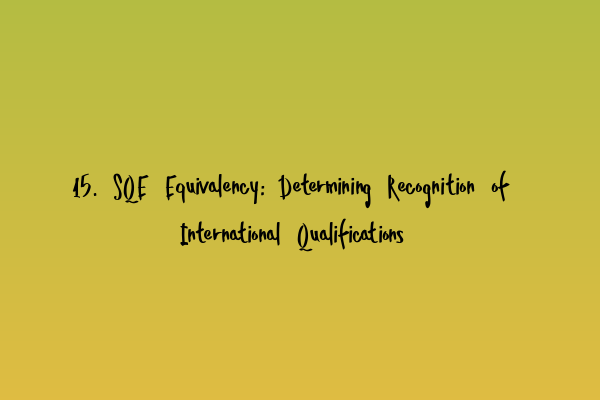15. SQE Equivalency: Determining Recognition of International Qualifications
In the dynamic world of law, professionals strive to expand their horizons and seek new opportunities on a global scale. As legal practitioners look to practice law in foreign jurisdictions, the recognition of international qualifications becomes a crucial aspect to navigate. This blog post aims to shed light on the SQE equivalency process and its significance in determining the recognition of international qualifications.
The Solicitors Qualifying Examination (SQE) is a rigorous assessment that evaluates the knowledge, skills, and competencies required to practice law in England and Wales. It offers an alternative route to qualification for both aspiring solicitors and those with international qualifications. Recognition of international qualifications through SQE equivalency provides a pathway for legal professionals to showcase their expertise and seamlessly integrate into the English legal system.
Determining the recognition of international qualifications through SQE equivalency process entails a comprehensive review of the educational background and professional experience of the individual. Here are some essential factors considered during this evaluation:
1. Accreditation: Accreditation of the university or institution from which the candidate obtained their legal qualification plays a pivotal role in determining the recognition. Recognized institutions demonstrate academic excellence and compliance with international standards.
2. Curriculum: The curriculum followed during the legal education is carefully examined to assess whether it covers the key areas of knowledge required to practice in England and Wales. Significant overlap in subjects taught provides a strong basis for recognition.
3. Duration of Study: The duration of legal studies is another critical aspect considered during the SQE equivalency evaluation. Similarity in the length of the qualification program ensures that the candidate has obtained sufficient knowledge and skills relevant to the legal profession.
4. Professional Experience: Alongside academic qualifications, professional experience is closely scrutinized to determine the level of practical exposure gained by the candidate. This includes internships, traineeships, or legal practice in the relevant jurisdiction.
5. Legal System Familiarity: Familiarity with the common law legal system, which forms the foundation of the English legal system, is crucial for recognition. Demonstrating understanding and experience within this framework strengthens the case for equivalency.
6. Language Proficiency: Proficiency in the English language is a mandatory requirement for practicing law in England and Wales. Candidates must provide evidence of their ability to effectively communicate, comprehend, read, and write in English.
7. Additional Qualifications: Any additional qualifications, certifications, or courses undertaken in areas relevant to English and Welsh law can enhance the prospects of recognition under the SQE equivalency process.
Successful recognition of international qualifications through SQE equivalency paves the way for individuals to embark on an enriching legal career in England and Wales. It opens doors to a myriad of opportunities, including law firms, corporate law departments, government agencies, and international organizations.
It is essential to note that the SQE equivalency evaluation is subjective, and each application is assessed on a case-by-case basis. The Solicitors Regulation Authority (SRA) assesses applications thoroughly, considering all relevant factors and ensuring fair judgment for all applicants.
In conclusion, the SQE equivalency process serves as a pivotal tool in determining the recognition of international qualifications for aspiring solicitors. Acquiring recognition through this process enables legal professionals to broaden their horizons, expand their career prospects, and contribute their expertise in the dynamic field of law in England and Wales.
If you are considering practicing law in England and Wales with international qualifications, it is crucial to understand the SQE equivalency process. Seek professional guidance and expert advice to navigate through this evaluation successfully. The legal landscape awaits talented professionals like you to make a meaningful impact!
Should you need assistance with the SQE equivalency process or any legal matters, our team of solicitors at SQE Exam Law is here to help. Contact us today to unlock your potential in the English legal system!
Remember, the world of law knows no boundaries, and with the right qualifications and recognition, your legal career can reach new heights.

Leave a Reply